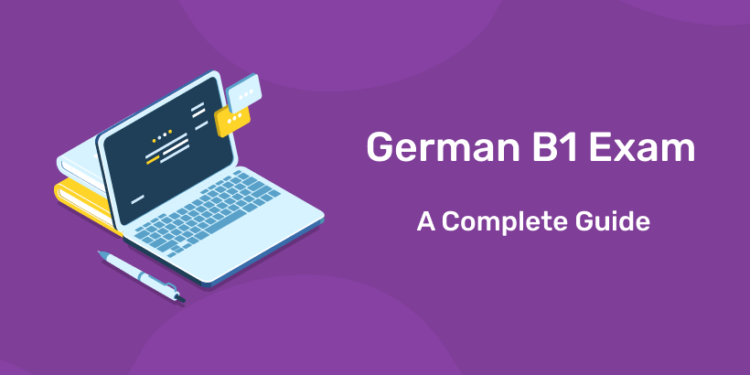Table of Contents
The German B1 Exam is an intermediate-level examination that serves as a crucial milestone in your language learning journey. Achieving success in the German B1 Exam demonstrates your ability to communicate effectively in everyday situations and opens up new opportunities for work, study, and travel in German-speaking countries.In this comprehensive guide, we will walk you through the key aspects of the German B1 Exam and provide you with valuable insights, study strategies, and resources to help you prepare effectively and perform your best on the exam. Learning a new language opens up a world of opportunities, and for many, German is a language of choice. As you progress through your German language journey, the B1 level marks a significant milestone. The B1 exam serves as a crucial evaluation of your German language skills and can be both challenging and rewarding. In this blog post, we will explore some tips and strategies to help you prepare for and succeed in the German B1 exam.
German B1 Exam – Insights
The German B1 Exam is designed to assess your language proficiency across four main sections: Listening Comprehension, Reading Comprehension, Writing, and Speaking. Each section evaluates different aspects of your language skills, including your ability to understand spoken and written German, express yourself in writing, and engage in spoken conversations. To succeed in the German B1 Exam, it’s crucial to have a clear understanding of the exam structure, question types, time allocation, and assessment criteria for each section. This knowledge will help you develop a targeted study plan and approach each section with confidence.
fly to your dream germany ! enroll to learn german language online !
1: How do you say "Good Morning" in German?
Speak German Fluently – Your Future Starts Here!
Join our interactive German courses designed for all levels. Gain the skills to communicate effectively and open doors to new cultures and careers.
Start Learning GermanGerman B1 Exam – Exam Format
To familiarize yourself with the exam format of the B1 level, it’s crucial to understand the different sections and expectations of each. By understanding the format and expectations of each section, you can tailor your preparation accordingly. Dedicate time to practice each skill and identify areas where you need improvement. Remember to simulate exam conditions during practice tests to become familiar with the timing and pressure. With regular practice and a solid understanding of the exam format, you will be well-prepared to tackle the German B1 exam. Here is a more detailed elaboration on each section.
|
German A2 Exercises – Download Free PDF |
||
1. Reading Comprehension:
The reading section of the B1 exam evaluates your ability to understand and interpret written texts. It typically consists of several texts, such as newspaper articles, advertisements, or short stories. You will be required to answer multiple-choice questions, fill in the blanks, or provide short answers based on the information presented in the texts. The questions assess your understanding of the main ideas, details, vocabulary, and the ability to infer meaning from context.
Tips:
– Practice reading a variety of texts to expose yourself to different writing styles and topics.
– Pay attention to keywords and context to better understand the meaning of unfamiliar words.
– Read actively by underlining key information and making notes as you go.
2. Writing:
The writing section assesses your ability to express yourself coherently and accurately in written form. You will be given prompts or topics and asked to write an essay, a letter, or an email. The prompts may require you to describe experiences, express opinions, or provide arguments on a given topic. Your writing will be evaluated based on grammar, vocabulary, sentence structure, coherence, and clarity of expression.
Tips:
– Practice writing regularly on various topics to improve your fluency and coherence.
– Pay attention to the prompt instructions and ensure your response addresses all required aspects.
– Revise and edit your writing for grammar and spelling mistakes before submitting.
| German Language Courses | |
| German Language A1 Course Online Coaching | German Language A2 Course |
| German Language B1 Course online Coaching | German Language B2 Course Online Coaching |
3. Listening Comprehension:
The listening section evaluates your ability to understand spoken German in various contexts. You will listen to conversations, interviews, or monologues and answer questions related to the audio. The questions may involve identifying main ideas, specific information, or the speaker’s attitude or opinion. You may also need to complete sentences or fill in the blanks based on the information provided in the audio.
Tips:
– Listen to a wide range of German audio materials, such as podcasts, news broadcasts, or dialogues.
– Practice active listening by taking notes while listening to improve your retention of key details.
– Familiarize yourself with different accents and speech patterns to better understand diverse speakers.
4. Speaking:
The speaking section assesses your ability to communicate orally in German. You will engage in a conversation with an examiner or another candidate and respond to prompts or questions. The tasks may involve describing experiences, expressing opinions, discussing a given topic, or role-playing a specific situation. Your speaking skills will be evaluated based on pronunciation, fluency, vocabulary usage, grammar accuracy, and the ability to engage in meaningful communication.
Tips:
– Practice speaking German as much as possible, even outside of the exam preparation.
– Engage in conversations with native speakers or language partners to build confidence and fluency.
– Pay attention to pronunciation, intonation, and stress patterns to improve your oral expression.
Learn German language in your own language! Get free Demo Classes Here!
German B1 Exam – Study Material
When preparing for the German A1 exam, utilizing the right study resources can greatly enhance your learning experience and improve your chances of success. Here are some valuable study resources to consider:
- Textbooks: German language textbooks specifically designed for the A1 level can provide comprehensive coverage of grammar, vocabulary, and exam-related topics. Look for textbooks that include exercises, practice questions, and audio materials to practice your listening skills.
- Grammar Guides: Grammar is a crucial component of language learning. A good German grammar guide will explain essential grammar concepts, verb conjugations, sentence structures, and common language patterns. Look for guides that provide clear explanations and examples to help you understand and apply grammar rules effectively.
- Online Language Communities: Engage with online language communities such as forums, social media groups, or language exchange platforms. These platforms allow you to connect with other German learners, native speakers, or language enthusiasts. You can participate in discussions, ask questions, and practice your language skills.
Why Entri?
Moving to Germany can be a good opportunity for those looking for a new start in their life. With Germany ranking as one of the top countries for expats, it’s no wonder that so many people consider it to be their ideal destination. Fortunately, Entri App makes it easier than ever to make the move to Germany and settle there.
Entri collaborates with the leading German language training institute, Lanstitut, to improve your language skills. The app provides various services, including visa and immigration advice, suitable or interesting courses, advice on finding a place to settle, etc. It offers a network of international professionals you can connect with to get insider tips. Moreover, Entri can provide support for language courses and language exchange programs. They also ensure that you are following all of the essential procedures to ensure that you are properly registered and have all of the necessary papers. With Entri App, you can make your moving process to Germany stress-free.
Ready to take your German language skills to the next level? Get Free Demo Classes Here!
Conclusion
As you progress through your German language journey, the B1 level marks a significant milestone. The B1 exam serves as a crucial evaluation of your German language skills and can be both challenging and rewarding. By understanding the format and expectations of each section, you can tailor your preparation accordingly. Dedicate time to practice each skill and identify areas where you need improvement. Remember to simulate exam conditions during practice tests to become familiar with the timing and pressure. With regular practice and a solid understanding of the exam format, you will be well-prepared to tackle the German B1 exam.
| German Language Course in Different Cities |
| German Language Course in Trivandrum |
| German Language Course in Thrissur |
| German Language Course in Kottayam |
| German Language Course in Kochi |
| German Language Course in Calicut |










